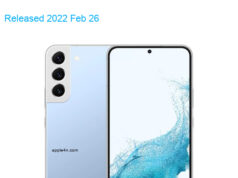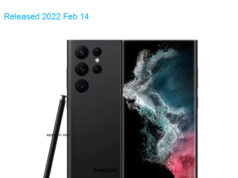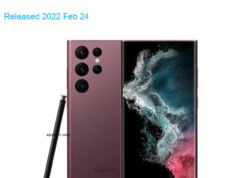| Brand | |
| Model | Pixel 8 Pro 5G UW TD-LTE US AU 512GB G1MNW |
| Released | 2023 Oct 12 |
| Announced | 2023 Oct 4 |
| Hardware Designer | |
| Manufacturer | Foxconn |
| Codename | Google Husky |
| General Extras | Haptic touch feedback |
| Device Category | Smartphone |
| Width | 76.5 mm |
| Height | 162.6 mm |
| Depth | 8.8 mm |
| Dimensions | 3.01×6.4×0.35 inches |
| Mass | 213 g |
| Platform | Android |
| Operating System | Google Android 14 (Upside Down Cake) |
| Software Extras | Voice Command , Navigation software , Augmented Reality (AR) , Intelligent personal assistant , Voice Recognition , Face Recognition |
| CPU Clock | 2914 MHz |
| CPU | Samsung Google Tensor G3 GS301 S5P9865 (Zuma), 2023, 64 bit, multi-core, 2560 Kbyte L2, 8192 Kbyte L3, 4 nm, ARM Mali-G715 GPU |
| RAM Type | LPDDR5X SDRAM |
| RAM Capacity (converted) | 12 GiB RAM |
| Non-volatile Memory Interface | UFS 3.1 |
| Non-volatile Memory Capacity (converted) | 512 GB ROM |
| Display Hole | 1-hole |
| Display Diagonal | 170 mm |
| Resolution | 1344×2992 |
| Horizontal Full Bezel Width | 6.84 mm |
| Display Area Utilization | 86.8% |
| Pixel Density | 490 PPI |
| Display Type | AM-OLED display |
| Number of Display Scales | 16.8M |
| Display Refresh Rate | 120 Hz |
| Scratch Resistant Screen | Gorilla Glass Victus 2 |
| Graphical Controller | ARM Mali-G715MP7 |
| GPU Clock: | 890 MHz |
| A/V Out | No |
| Microphone(s) | 3 |
| Loudspeaker(s): | stereo |
| Audio Output: | USB Type-C |
| Supported Cellular Bands | GSM850 , GSM900 , GSM1800 , GSM1900 , UMTS2100 (B1) , UMTS1900 (B2) , UMTS1700/2100 (B4) , UMTS850 (B5) , UMTS800 (B6) , UMTS900 (B8) , UMTS800 (B19) , LTE2100 (B1) , LTE1900 (B2) , LTE1800 (B3) , LTE1700/2100 (B4) , LTE850 (B5) , LTE2600 (B7) , LTE900 (B8) , LTE700 (B12) , LTE700 (B13) , LTE700 (B14) , LTE700 (B17) , LTE800 (B18) , LTE800 (B19) , LTE800 (B20) , LTE1900 (B25) , LTE850 (B26) , LTE700 (B28) , LTE700 (B29) , LTE2300 (B30) , TD-LTE2600 (B38) , TD-LTE1900 (B39) , TD-LTE2300 (B40) , TD-LTE2500 (B41) , TD-LTE3600 (B48) , LTE1700/2100 (B66) , LTE600 (B71) , NR2100 (N1) , NR1900 (N2) , NR1800 (N3) , NR850 (N5) , NR2600 (N7) , NR900 (N8) , NR 700 (N12) , NR800 (N20) , NR850 (N26) , NR1900 (N25) , NR700 (N28) , NR700 (N29) , NR2300 (N30) , TD-NR2600 (N38) , TD-NR2300 (N40) , TD-NR2500 (N41) , TD-NR3600 (N48) , NR1700/2100 (N66) , NR1700/2000 (N70) , NR600 (N71) , TD-NR3700 (N77) , TD-NR3500 (N78) , TD-NR28G (N257) , TD-NR26G (N258) , TD-NR39G (N260) , TD-NR28G (N261) bands |
| Supported Cellular Data Links | GPRS , GPRS MSC33 , EDGE , UMTS , HSUPA , HSUPA 5.8 , HSDPA , HSPA+ 21.1 , DC-HSDPA 42.2 , LTE , LTE 100/50 , LTE 150/50 , LTE 225/50 , LTE 300/50 , LTE 300/75 , LTE 400/150 , LTE 1200/200 , NR 1500 , NR 2600 , NR 3700 , NR 4600 data links |
| SIM Card Slot | e-SIM , Nano-SIM (4FF) |
| Complementary Phone Services | Voice transmission , Voice speaker , Vibrate , Speakerphone , ANC , HD Voice , VoLTE , ViLTE |
| Sec. Supported Cellular Networks: | No |
| Touchscreen Type | Capacitive multi-touch screen |
| Expansion Interfaces | No |
| USB | USB 3.0 / 3.1 Gen 1 / 3.2 Gen 1×1 |
| USB Services | USB charging , USB fast charging , USB Host , USB OTG 1.3 , USB OTG 2.0 , USB PD , USB PD 2.0 , USB PD 3.0 |
| USB Connector | USB C reversible |
| Max. Charging Power | 30.0 W |
| Bluetooth | Bluetooth 5.3 |
| Wireless LAN | 802.11a , 802.11b , 802.11g , 802.11n , 802.11ac , 802.11ax , 802.11be |
| Wireless Services | Miracast , Wi-Fi Direct , Wi-Fi Tethering , WiDi , Wi-Fi Calling |
| NFC | NFC A , NFC B |
| FM Radio Receiver | No |
| Complementary Satellite Services | Simultaneous GPS , A-GPS , Dual-frequency GPS , Geotagging , QuickGPS , QZSS |
| Supported GLONASS protocol(s) | L1OF , L2OF |
| Supported Galileo service(s) | E1 , E5a |
| Supported BeiDou system (BDS) | B1I , B2a BeiDou receiver |
| Camera Placement | Rear |
| Camera Image Sensor | BSI CMOS |
| Image Sensor Pixel Size | 1.20 micrometer |
| Number of effective pixels | 50.1 MP camera |
| Aperture (W) | f/1.68 |
| Zoom | 4.5 x optical zoom |
| Focus | PD AF , Laser AF |
| Min. Equiv. Focal Length | 25 mm |
| Video Recording | 3840×2160 pixel |
| Flash | dual LED |
| Camera Extra Functions | EIS , EIS (video) , OIS , Pixel unification , HDR photo , HDR video , Red-eye reduction , Slow motion video , Burst mode , Touch focus , Macro mode , Panorama Photo , Face detection , Face tagging , Smile detection , Face retouch , Face retouch (video) , Intelligent scene detection |
| Aux. Camera Image Sensor | BSI CMOS |
| Aux. Cam. Image Sensor Pixel Size | 0.80 micrometer |
| Aux. Camera Number of Pixels | 48.0 MP aux. cam |
| Aux. Camera Aperture (W) | f/1.95 |
| Aux. Camera Focus | PD AF |
| Aux. Camera Extra Functions | Pixel unification , HDR photo , HDR video , Red-eye reduction , Burst mode , Touch focus , Panorama Photo , Face detection , Face tagging , Smile detection , Face retouch , Face retouch (video) , Intelligent scene detection |
| Aux. 2 Camera Image Sensor | BSI CMOS |
| Aux. 2 Camera Number of Pixels | 48.0 MP aux. 2 cam |
| Aux. 2 Camera Aperture (W) | f/2.80 |
| Aux. 2 Cam. Min. Equiv. Focal Length | 113 mm |
| Aux. 3 Camera Image Sensor | No |
| Aux. 4 Camera Image Sensor | No |
| Secondary Camera Placement | Front |
| Secondary Camera Sensor | BSI CMOS |
| Secondary Camera Number of pixels | 10.0 MP sec. cam |
| Secondary Aperture (W) | f/2.20 |
| Secondary Camera Focus | PD AF |
| Secondary Video Recording | 3840×2160 pixel |
| Secondary Camera Extra Functions | EIS , EIS (video) , HDR photo , HDR video , Slow motion video , Burst mode , Touch focus , Panorama Photo , Face detection , Face tagging , Smile detection , Face retouch , Face retouch (video) |
| Sec. Aux. Cam. Image Sensor | No |
| Built-in compass | Yes |
| Built-in accelerometer | 3D accelerometer |
| Built-in gyroscope | 3D gyro |
| Additional sensors | Barometer , In-screen FP sensor , L sensor , P sensor , Step counter , Thermometer |
| Protection from solid materials | 6 Totally protected from dust |
| Protection from liquids | 8 Protected against immersion beyond 1m of depth |
| Immersion into liquids (depth limit) | 150 cm |
| Immersion into liquids time limit | 30 min |
| Battery | Li-ion polymer (LiPo) |
| Nominal Battery Capacity | 5050 mAh battery |
| Estimated Battery Life | 27.0 hours |
| Wireless Charging | Qi , Qi reverse |
| Max. Wireless Charging Power | 18.0 W |
| Market Countries | Australia , USA |
| Market Regions | Australia , North America |
| Price | 1319.34 USD |
| Added | 2025-01-29 |
Specifications data description of this 📱Google Pixel 8 Pro 5G UW TD-LTE US AU 512GB G1MNW📱
Title: Google Pixel 8 Pro 5G UW TD-LTE US AU 512GB G1MNW – A Comprehensive Specification Overview
Introduction:
The much-awaited Google Pixel 8 Pro 5G UW TD-LTE US AU 512GB G1MNW is finally here, and it promises to be a game-changer. With top-notch features, sleek design, and powerful hardware, the new Pixel 8 Pro is set to take the smartphone market by storm. In this blog post, we will provide a comprehensive overview of the device’s specifications, so you can make an informed decision before purchasing. We will cover everything from network capabilities to battery life, so stay tuned!
Lineup:
As the name suggests, the Pixel 8 Pro is Google’s latest flagship device, and it comes with an impressive lineup of features. The device is available in a single configuration, with 512GB of internal storage and support for 5G UW TD-LTE US AU networks. Additionally, the device is compatible with Google’s G1MNW network, making it one of the most versatile devices on the market.
Design:
The Pixel 8 Pro boasts a sleek and modern design, with a slim profile and a large display. The device features a 6.7-inch OLED display with a resolution of 3120 x 1440 pixels, making it perfect for watching movies and playing games. Additionally, the display features a 120Hz refresh rate, making it one of the smoothest and most responsive displays on the market.
Specifications:
🌐 NETWORK:
– 5G UW TD-LTE US AU
– G1MNW
📅 LAUNCH:
– June 2023
🏋️ BODY:
– 160.2 x 75.6 x 8.4 mm
– 210 g
🌈 DISPLAY:
– 6.7-inch OLED
– 3120 x 1440 pixels
– 120Hz refresh rate
– HDR10+
🤖 OS 🛠️:
– Android 13
🚀 Chipset 🔧:
– Google Tensor G2
– Octa-core (2×2.8 GHz Cortex-X1 & 2×2.4 GHz Cortex-A78 & 4×1.8 GHz Cortex-A55)
💪 CPU 🖥️:
– Octa-core
– 2.8 GHz Cortex-X1 and 2.4 GHz Cortex-A78
🎮 GPU 💻:
– Mali-G78 MP20
🧠 MEMORY 🗂️:
– 12GB RAM
– 512GB Internal Storage
📷 CAMERA 🎥:
– 50 MP, f/1.8, 1/1.3″, 1.2µm, Dual Pixel PDAF, OIS
– 48 MP, f/3.5, 120mm (periscope telephoto), 1.2µm, PDAF, OIS, 10x optical zoom
– 12 MP, f/2.2, 17mm (ultrawide), 1.4µm
– TOF 3D camera
🔈 SOUND 🎵:
– Stereo speakers
– 3.5mm headphone jack
📡 COMMS 📶:
– Wi-Fi 802.11 a/b/g/n/ac/6e
– Bluetooth 5.2
– NFC
– GPS, GLONASS, GALILEO, QZSS, SBAS
💡 FEATURES 🎁:
– In-display fingerprint sensor
– Face unlock
– IP68 dust/water resistant
– Corning Gorilla Glass Victus protection
– Pressure-sensitive sides
– Haptic feedback
🔋 BATTERY🔌 :
– 5000mAh non-removable
– Fast charging
– Wireless charging
– Reverse wireless charging
Conclusion:
In conclusion, the Google Pixel 8 Pro 5G UW TD-LTE US AU 512GB G1MNW is an impressive device with top-notch features and powerful hardware. From the sleek design to the smooth display, and from the powerful CPU to the versatile camera system, the Pixel 8 Pro is a device that is sure to impress. Now that you have a comprehensive overview of the device’s specifications, we invite you to share your thoughts in the comments section below. What do you think of the new Pixel 8 Pro? Will you be purchasing one for yourself? Let us know!







